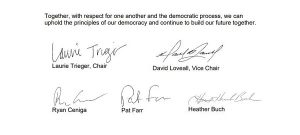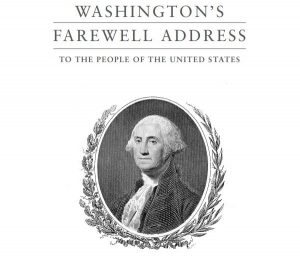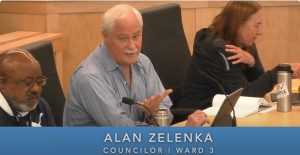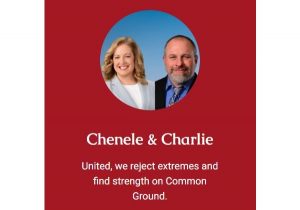City budget gap could exceed $20 million
9 min read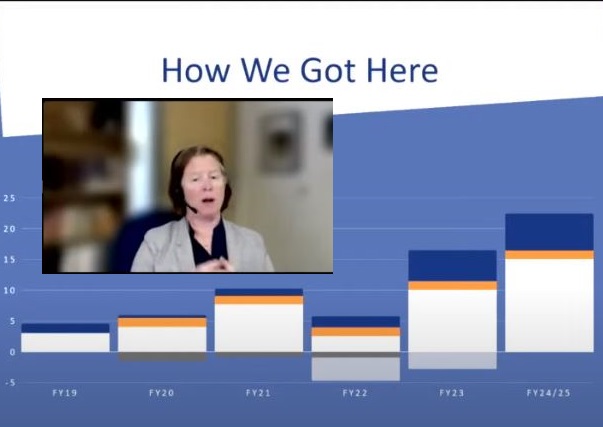
With the gap between revenue and costs now projected to exceed $20 million, the new priority-based budget could drive dramatic changes at the city. At the Budget Committee meeting Dec. 7:
[00:00:14] City Manager Sarah Medary: We’ve been doing so many things and trying to accomplish so many things in the community. Some of it we’ve been doing with ongoing funds and some we’ve been doing with one-time (funding).
[00:00:22] And so some of the services that have changed, like the needs around homelessness and climate — these have become priorities that we need to figure out how we’re going to fund ongoing. And the only way I could see doing that is to kind of get back into a very basic business rhythm of, you know, really understanding what it is that the community is needing, what’s going out in the community that allows the policy makers, the council to set goals.
[00:00:48] It allows us to kind of plan strategically around that before we start budgeting. And that’s been a little bit out of alignment. I’ve been working to get us there. We’re closer this year than ever. It’s still a little bit messy, but that’s really the only way is to kind of transform the way we’re doing business.
[00:01:05] So when we talk about $15 to $20 million or more, it’s because we are always thinking about the things that should really be ongoing funds that aren’t. That’s really how this number keeps growing.
[00:01:17] And unfortunately, we’ve right-sized our organizations a couple of times. We did it during the recession and then, you know, because of the way our property tax system works, you know, oftentimes our costs we can’t really control very well are outrunning what we are able to earn.
[00:01:33] So we have to right-size again and I think we all will agree that we need to find a better way to stabilize the revenue piece so that both of those are grown at the same time.
[00:01:42] The other thing we’re doing related to priority-based budget is to go in, program by program, and evaluate, you know, what are potential revenue opportunities, what are potential partnership opportunities, you know, are there efficiencies? How could you scale this? Can it be scaled?
[00:02:00] And we invited people to give us basically their ideas. The ResourceX platform calls it the ‘Program Insights.’ It’s basically what are all of your ideas for how we could be saving money, what are your ideas about what we could stop doing, what are your ideas about revenues?
[00:02:18] And we are currently sorting through a massive amount of those that will be used as the basis of our budget that we put together, that I put together, and we’ll also be able to show you all the different places we explored. And it’s been a really great way for employees to be engaged in the process as well.
[00:02:36] How do we want to focus our resources and where do we need to make the biggest impact? And how are we going to measure and communicate that? So we’re, I keep calling it the messy middle. We’re in like sort of the middle of the story, which is, it’s not as exciting as the beginning and it’s a little uncertain how it’s going to end with all of this going on, but it’s really, really important work and I think sets us up for a better fiscal stability in the future.
[00:03:01] John Q: The city has made efforts to reduce the gap in recent years. But Sarah said the city took a big hit with the Comcast settlement.
[00:03:08] City Manager Sarah Medary: Several of you called me a buzzkill because we were preparing and we’ve been working and we’ve been working through challenges, we made a bunch of reductions. And then I think the Comcast settlement was the last kind of blow, of realizing our gap was just significantly bigger and it felt like the end of the road, and we immediately, for every way we prepared, we immediately got hit with another, you know, close to $5 million revenue reduction. So that one hurt.
[00:03:38] John Q: The city manager addressed questions about holding the affordable housing funds in the reserve fund.
[00:03:44] City Manager Sarah Medary: Every year we put $500 (thousand) for the affordable housing trust fund, we have, you know, this year we have a lot of money that’s sort of tucked aside for helping pay for some affordable housing projects and we don’t absolutely have a project in the pipeline to put that $500 (thousand) to.
[00:04:01] And so I asked to keep it in reserves until we come around the Supplemental Budget 2, and if there’s a project that’s Supplemental Budget 2, and we have a way to attribute it, that’s fine. Otherwise, I just prefer it sits in reserves until we’re ready for it.
[00:04:14] So it shouldn’t signal a lack of support for that work. We all know it’s the most critical work, but it’s just a matter of where it sits in the city’s budget and what kind of message that sends in terms of our fiscal health.
[00:04:28] Having that reserve account as healthy as we can possibly get it when we come around to our Moody’s rating in the spring, will also save us a lot of money in the out years. So that one’s a really important one.
[00:04:40] John Q: Underscoring the importance of the reserves, Finance Director Twylla Miller.
[00:04:44] Finance Director Twylla Miller: Moody’s, our bond rating agency, considers reserve levels a key metric.
[00:04:52] Zach Mulholland (Budget Committee Member): Hi. Thank you for the opportunity to be here tonight. I think it’s very clear that there is a need for revenue, both for ongoing needs as well as new priorities. And I hope that the Budget Committee can look at revenue sources potentially through a revenue subcommittee. I hope that we can potentially look at how we can head off some of these changes.
[00:05:11] City Councilor Matt Keating: I want to thank Zach for bringing up the concept of a revenue-generating subcommittee. Whether that a particular ad-hoc committee or subcommittee is Budget Committee-driven or council-driven, I applaud the idea. In a newly-proposed two-year budget cycle, it may make the most sense for that to be a council-driven committee, but nevertheless I welcome the conversation.
[00:05:36] Tai Pruce-Zimmerman (Budget Committee Chair): I do want to offer acknowledgement that several people have shown interest in a revenue subcommittee, or at least a revenue conversation of some kind. I want to thank Zach Mulholland initially for starting that conversation, and so the only question is whether it makes more sense for it to be a budget subcommittee or whether it’s going to be council-driven. And I see that as council’s call.
[00:06:02] If a budget subcommittee is what makes the most sense, I am happy to convene it as chair, but I’m not going to just jump in with that authority while council’s deciding the right way to do this. So definitely those conversations will continue about the right way to have that conversation, and we will make sure that it happens.
[00:06:24] Councilor Mike Clark: I hope we don’t get trapped just in the mentality of cutting. I hope we’ll look at this on the other side as well. And this is, I suppose, advice for the revenue committee. Not, again underlined, not at which new taxes we might create and impose on the people of Eugene, but that we look at this differently. We’re capped with something near 4% on property tax growth for rate in the future. But what we’re not capped with is how much property is taxed and how much the value of that property is, if we add functional property to the base of what we’re doing.
[00:07:10] So I’m going to quote my friend (Senior Planner) Heather (O’Donnell) when it comes to planning information here, and I think she’s awesome. And she has officially this last year turned me around on my focus on UGB (Urban Growth Boundary) and whether it’s adequate or not with one simple fact that we don’t talk about at all, and I think we’re totally missing the boat. We have inside our UGB already a huge amount of land to build on, and 48% of it—nearly half—is unbuildable for homes. Half of the land inside our UGB cannot have homes built on it. And we’re saying to the state in our planning, ‘We’re adequate, we’re just fine, ‘cause we have all this land we can build on,’ except for the fact that, you know, we can’t build on it.
[00:08:03] I will remind the councilors of what they already know: That there are 22,000 people who live in River Road and Santa Clara who are not members of the city and don’t pay city property taxes.
[00:08:17] Now, I’m not for a second suggesting forced annexation, but I am suggesting we could be doing a heck of a lot more to offer a voluntary annexation opportunity that brings a whole new river of money to the city, and at the same time gets those people who already think they’re residents of the city, the kind of services that they deserve, and the kind of say at the council table, they deserve by having a representative.
[00:08:49] So I think a voluntary annexation plan is perfectly timed. It won’t happen fast at first. It’ll happen slow. But it’ll build with time and it’s the smart thing for us to do to see more property taxes heading towards the city than towards a group of special districts in that area. And we grow more whole as a community in the process of doing it.
[00:09:16] So I hope that’s something we get to talk about here this next year as well.
[00:09:22] Councilor Randy Groves: When businesses do look at locating manufacturing, for example, they want something that’s shovel-ready and speed is very important.
[00:09:30] And right now, especially with some opportunities that we have with federal and state funding around green energy technology, not only does it help solve the climate crisis, but it also provides living-wage jobs for people in our community, and it also builds the tax base. And one of our ladders out of our financial hole is managed, controlled economic growth.
[00:09:57] ‘A rising tide floats all boats,’ and that would help with some of these problems, not for this next year, but certainly in the life of the forecast. Some of this is possible if we are able to act and marshal resources to make that happen. And I recognize at a time we need to be cutting back, sometimes you also need to invest, to work our way through the problem. So I’ll be very interested in some of those conversations.
I was excited today at IGR (Intergovernmental Relations Committee) when we talked a little bit about this as a priority for some of our work at the state level in trying to tap into some of those funds to hopefully help with this.
[00:10:38] Tai Pruce-Zimmerman: Thank you. Siobhan (Cancel) next.
[00:10:40] Siobhan Cancel (Budget Committee member): I noticed that the city has spent a lot of time and effort and money in building an office of Equity and Engagement. And so I just want to provide some comments and feedback from some of the community members I’ve spoken with and how impactful that is to see the city actually elevating that up to a level of priority.
[00:10:58] So I know we’re talking cuts and that’s what we have to do, but I would just like to throw out a ‘Woohoo!’ for some of the progress that has been made in that department and the impact that I’ve seen in community members. So, and that’s it.
[00:11:13] John Q: The city council moves to a priority-based budget, as staff foresees a budget gap that could exceed $20 million.
